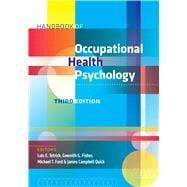This third edition offers 14 new chapters and a fully updated, comprehensive survey of the field of occupational health psychology, including its history, theories, models, interventions, and empirical research.
Grounded in the NIOSH Total Worker Health® model, this new edition on Occupational Health Psychology (OHP) reflects the expanding scope of the field, as well as recent changes in the nature and organization of work. It is an essential resource for professionals and scholars who seek to prioritize worker safety while promoting their health and well-being. OHP is informed by research from psychology subdisciplines including I/O, human factors, cognitive, social, health, clinical, counseling and developmental psychology, as well as public health, preventive medicine, occupational medicine, ergonomics, industrial hygiene, and industrial engineering.
Historically, OHP focused on preventing illness, injury, or distress of workers in their work environments. The field today has expanded to encompass more proactive, holistic approaches to worker well-being that also includes workers’ job and life satisfaction, positive emotional experiences, sense of meaningfulness, and social support and relationships. OHP has also become more interdisciplinary and global.








